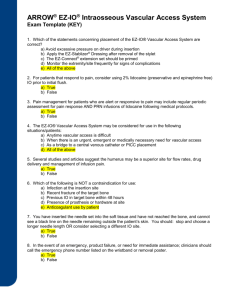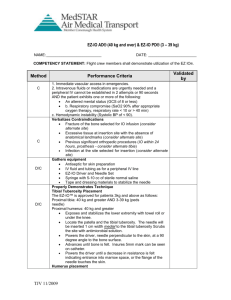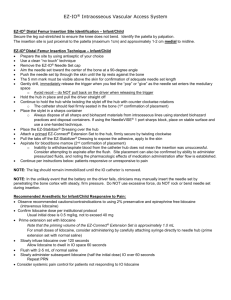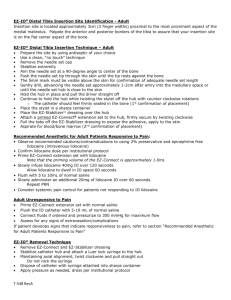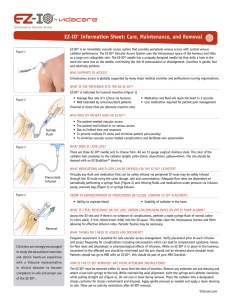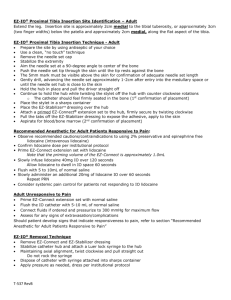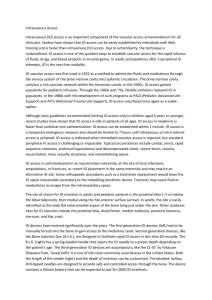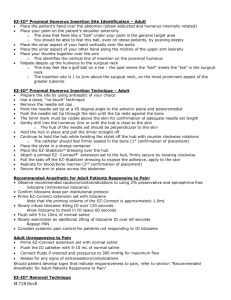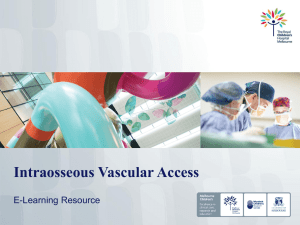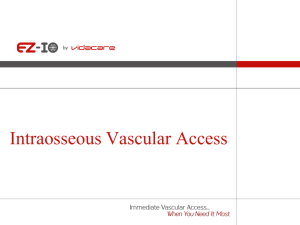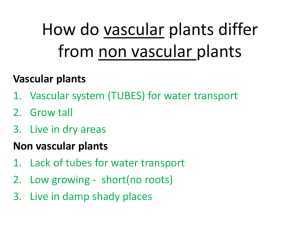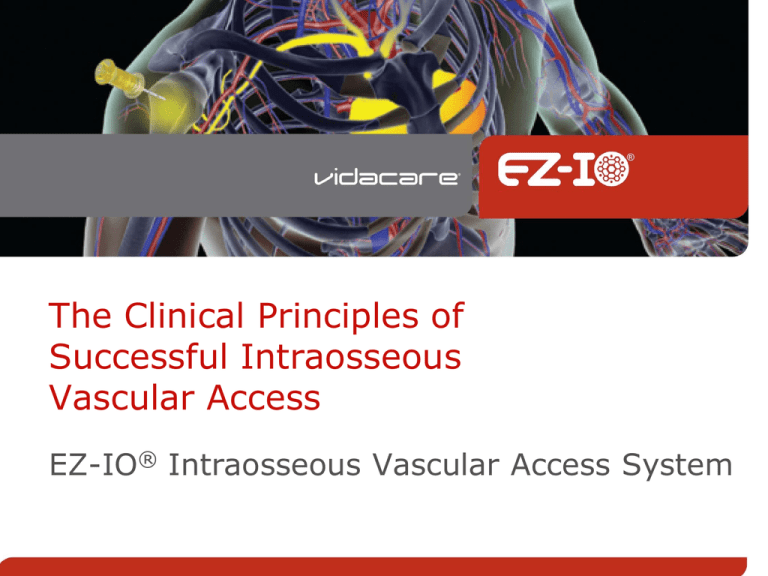
The Clinical Principles of
Successful Intraosseous
Vascular Access
EZ-IO® Intraosseous Vascular Access System
Indications
The EZ-IO® Intraosseous Vascular
Access System is indicated for
adult and pediatric patients any
time vascular access is difficult to
obtain in emergent, urgent or
medically necessary situations
2014-2780
IO History
• 1922 – Drinker
• 1942 - Papper
• 1945 - WW II
• 1985 - Orlowski
Global Leaders: Emergency & Critical Care
• American Heart Association (AHA)
– 1988 – Pediatric Advanced Life Support (PALS)
– 2005 – Advanced Cardiac Life Support (ACLS)
• European Resuscitation Council (ERC)
• International Liaison Committee on Resuscitation (ILCOR)
2014-2780
Best Practice/Organizational Support
National Association of EMS Physicians (NAEMPS)
• 2007 position paper
Infusion Nurses Society (INS)
• 2009 Position Paper
Emergency Nurses Association (ENA)
• Emergency Nursing Resource for Difficult Intravenous
Access
• Emergency Nursing Pediatric Course (ENPC)
• Trauma Nursing Core Course (TNCC)
American Association for Critical-Care Nurses (AACN)
American College of Emergency Physicians (ACEP)
• 2011 clinical policy statement
2014-2780
Evidence Based Care
• Research articles on IO vascular access – 500+
• Research articles regarding use of the EZ-IO®
Intraosseous Vascular Access System – 170,
including:
• Approximately 60 case studies/clinical trials
• Over 4700 patients studied
EZ-IO® Utilization
• Estimated 2 million patients
• 50 Countries
2014-2780
Who Can Utilize The EZ-IO®
Vascular Access System?
Medical Professionals
Typical Requirements
•
•
•
•
•
•
•
•
Physicians
PA, APN
Nurses
EMT-P, EMT-I
2014-2780
Policy/protocol
Education
Competency
Practice
When Can the EZ-IO® Vascular Access
System Be Used?
Emergent Situations
• Immediate need for medications or fluids
• Prevent delays during critical situations
Non-emergent & Urgent Situations
• Difficult Vascular Access (DVA)
2014-2780
Fast, effective, low risk option for
difficult vascular access (DVA)
• Eliminate multiple peripheral IV attempts
• Vein preservation
• Decrease time consuming US guided PIV
• Avoid risky and poorly tolerated EJ lines
• Prevent “emergent” PICC placement
• Avoid challenges with Vascular Access team
availability
• Bridge to properly placed CVC
• Decreases risk of complications
2014-2780
Anatomy and Physiology
Highly vascular, non-collapsible access
Rapid flush to
displace
marrow
2014-2780
Real-time Fluoroscopy – Human Model
2014-2780
Contraindications
• Fracture of target bone
• IO or attempted IO within previous 48 hours in
target bone
• Prosthesis or orthopedic procedure near
insertion site
• Infection at area of insertion
• Inability to identify landmarks
2014-2780
Site Selection
• Flow rates average 5L/hr
• 3 seconds to heart with
medication/fluids
• Lower insertion & infusion pain
• Less medication required for pain
management
• No reported compartment
syndrome due to IO placement
Do NOT use the powered
EZ-IO® Vascular Access System
in the sternum!
2014-2780
Proximal Humerus Site Identification
EZ-IO® Humerus Site Identification Video External M-806 RevB
2014-2780
Proximal Tibia Site Identification
Infant/Child
Adult
Growth
Plate
2014-2780
Distal Tibia Site Identification
Midline
on the bone
2014-2780
EZ-IO® Needle Set Selection
15mm
25mm
45mm
15 gauge
Indicated for patients
weighing 3-39 kg
15 gauge
Indicated for
patients weighing
3 kg or over
15 gauge
Indicated for
patients weighing
40 kg or over
2014-2780
Needle Set Selection
Estimate tissue depth
Confirm with 5mm mark
YES
NO
5mm
2014-2780
Prepare Supplies
•Prepare site
•Open the EZ-Stabilizer® Dressing
•Prime the EZ-Connect® Extension Set
•Attach Needle Set to Driver
2014-2780
Technique
•
•
•
•
Precision
Control
Gentleness
Speed
Cross-section of bone
2014-2780
Insertion Angle
Humerus: Insert
needle set at a 45O
angle to the
anterior plane and
posteromedial
Tibia: Insert needle set at a 90-degree angle to the bone
2014-2780
Insertion Technique
2014-2780
Insertion Completion
Stabilize hub and remove driver
Remove stylet
Apply EZ-Stabilizer® dressing
Aspirate for labs as needed
Firmly attach primed EZ-Connect®
extension set
Place EZ-IO® wrist band
2014-2780
Rapid Flush
Adults: 5-10mL NS
Infants & Children: 2-5mL NS
Consider for blood typing and other commonly ordered labs
2014-2780
Infusion & Medications
• For optimal flow infuse with pressure
• Administer medications in same
dose, rate and concentration as given
via peripheral IV
2014-2780
Pain Management
Prime extension set with 2% lidocaine (IV lidocaine)
Slowly infuse initial dose over 120 seconds
Allow lidocaine to dwell in IO space 60 seconds
Flush with normal saline
Slowly infuse 1/2 of initial dose over 60 seconds
Observe cautions/contraindications for lidocaine, confirm dose per institution
2014-2780
Assessment
• Site/Catheter
• Intact/patent
• EZ Stabilizer® dressing & connections are secure
• Need for repeat flush
• Evidence of complications
• Pain assessment
• Need for additional lidocaine
2014-2780
EZ-IO® Catheter Removal
2014-2780
Driver Care
•Clean per your institution’s protocol or see Instructions for Use
•Check to ensure nothing has attached to the magnetic tip
•Inspect driver and return to case or replace trigger guard
•Do NOT submerge or autoclave driver!
2014-2780
24 Hour Clinical Support
800-680-4911
or
www.vidacare.com
Connect with the
EZ-IO® App
for iPhone & Android
2014-2780
STERRAD® is a product of Advanced Sterilization Products, a Johnson
and Johnson Company.
NeedleVISE® is a product of Atrion Medical Products, Inc.
Level 1® is a product of the Medical Division of Smiths Group, plc.
Teleflex, EZ-Connect, EZ-IO and EZ-Stabilizer are trademarks or
registered trademarks of Teleflex Incorporated or its affiliates.
Vidacare is a wholly owned subsidiary of Teleflex Incorporated.
© 2014 Teleflex Incorporated. All rights reserved. 2014-2780
2014-2780

